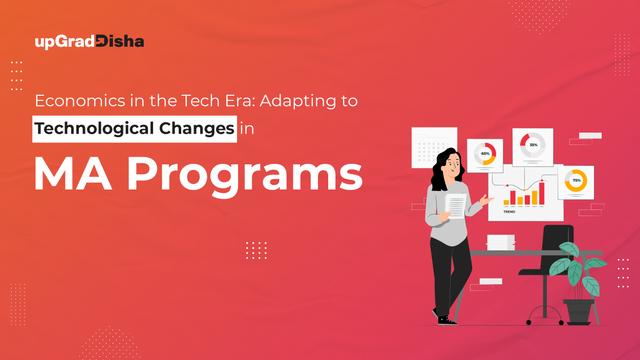Economics in the Tech Era: Adapting to Technological Changes in MA Programs
February 20th, 2024: 6 mins
|
This Article Explores:
|
Are the current MA Programs in economics keeping up with the technological advancements?
While technology dramatically reshapes every industry, the integration of tech advancements in the field of economics has become extremely important.
With global digitation reaching an astonishing $3.4 trillion by 2026, an important question arises: Are we preparing economists for this new reality? |
A shift in economics education is crucial to introduce new technology-focused courses and fundamentally reimagining the entire curriculum. The goal? To forge a new generation of economists who are not only versed in traditional economic theories but are also adept at applying technological tools to solve complex economic problems.
The time has come to bridge the gap between academic training and the demands of a rapidly evolving digital economy.
Let’s explore the importance of adapting to new-age technological advancements in MA Programs in Tech Economics.
Technological Trends Reshaping Economics
The landscape of economics is being reshaped by several key technological trends, each heralding new challenges and opportunities:
Process Automation and Virtualization: The automation of half of all existing work activities in the coming decades, as predicted by McKinsey, necessitates economists who understand the implications of automation and virtualization on labor markets, productivity, and economic policy.
The Future of Connectivity: With 5G and IoT set to unlock $1.2 trillion to $2 trillion in global GDP by 2030, economists must grasp the economic opportunities and challenges of faster digital connections, impacting sectors from healthcare to manufacturing.
Distributed Infrastructure: The shift towards hybrid-cloud and multi-cloud platforms demands an understanding of how decentralized data processing affects economic models, market dynamics, and cybersecurity.
Next-Generation Computing: Innovations like quantum AI and autonomous vehicles will revolutionize data analysis, problem-solving, and economic forecasting, requiring a new line of economists adept in these technologies.
Applied Artificial Intelligence (AI): As AI begins to drive more and more interactions with computers, its application in economic analysis, policy-making, and market predictions becomes crucial for future economists.
These trends mark the future of global economics. No matter which country, a thorough grasp of these trends can help students become expert economists.
Technological Changes in Economics Education

The digital advancements, marked by the increased usage of big data, artificial intelligence (AI), and blockchain, among other technologies, have altered the economic landscape. This shift extends beyond mere technological innovation, signaling economic analysis in the tech era and its application.
For MA programs in economics, the challenge is twofold:
- Incorporating these technological advancements into the curriculum
- Ensuring that graduates possess the skills to use technology in economic analysis and policymaking.
The transformation of economics education is not just a response to the changing job market; it's a proactive step towards equipping future economists with the tools they need to thrive in a tech-driven world. There are universities that help students analyze these trends and be prepared for the future.
Elevating Economics Education: Kurukshetra University's Approach
Kurukshetra University has meticulously designed its Distance MA Degree in Economics to cater to the evolving demands of the digital economy. This program is a testament to the university's dedication to providing a tech-driven economics curriculum that is current and future-ready. Here's how the program stands out:
-
Practical Curriculum with Real-world Applications
Delving into subjects like Mathematical Economics, Public Finance, and International Economics, the program ensures that students don't just learn theories but understand their application in today's tech-driven economic landscape. With an emphasis on case studies and guides, the course material is tailored to bridge the gap between academic concepts and real-world economic challenges.
-
Soft Skills for the Modern Economist
The university recognizes that technical knowledge alone doesn't make a successful economist. Hence, the program equally focuses on nurturing essential soft skills:
- Communication: Equipping students to convey complex ideas with clarity.
- Critical Thinking: Encouraging a deeper analysis of data and trends.
- Networking: Facilitating connections that matter within and beyond the classroom.
-
Industry Insights
The inclusion of masterclasses by industry leaders brings the latest economic trends and practices to the classroom. This exposure is invaluable for students, offering a glimpse into the economic intricacies shaped by ongoing technological advancements.
-
Engagement and Interaction
With an active learning environment, the program encourages participation, debate, and the application of knowledge in practical scenarios. This approach is designed to keep students engaged and invested in their learning journey, making education both impactful and enjoyable.
In crafting this distance MA in Economics, Kurukshetra University has not just created a program but a platform for aspiring economists to excel in the digital age. It's an invitation to engage with economics in a manner that's dynamic, interactive, and, most importantly, relevant to the challenges and opportunities of the contemporary world.
Key Takeaways
Kurukshetra University's Distance MA in Economics program stands as a testament to the evolving landscape of economics education, tailored to meet the demands of the digital era. By integrating cutting-edge technological trends with comprehensive economic theories and prioritizing practical applications and soft skills development, Kurukshetra University is preparing its students not just to navigate but to lead in the tech-driven economic landscape.
upGrad Disha further encourages you to explore leading online MA programs from its extensive catalog, helping you with diverse career opportunities in today’s competitive realm!
